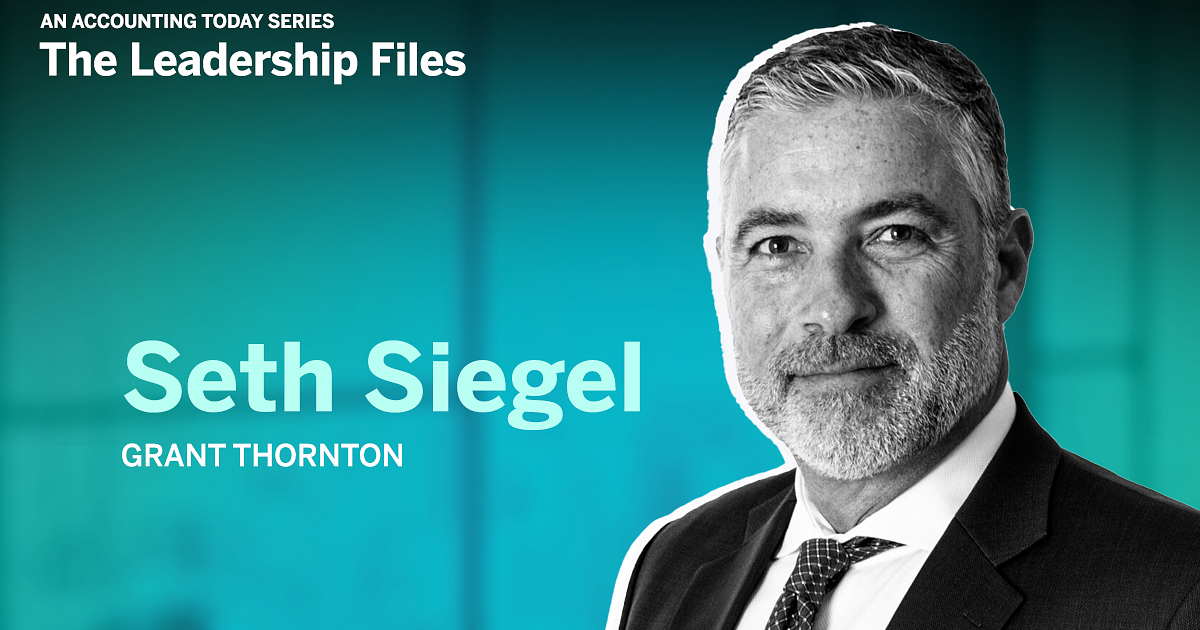
After his older brother, Seth Siegel was only the second person in his family to graduate from college. Seeing his sibling succeed in the world of finance made him realize that it offered the financial and job stability that his family never got to enjoy, and Siegel ended up pursuing a career in accounting.
He believed that becoming financially literate would allow him to explore his interest in business ownership and entrepreneurship, as recognizing how and why companies fail and succeed would be useful for his ambitions. When it comes to public accounting, Siegel said he considered gaining exposure to various industries and businesses as the equivalent of earning an MBA, because of the practical experience it offers in terms of understanding their challenges.
However, the path that eventually took him to Grant Thornton wasn’t always that clearly laid out, and Siegel went through long periods of doubt.
“I took a year and a half out of school, I changed universities, I changed majors and I was really struggling to find my footing,” he said. “When I started interviewing, I was really looking for a firm that would tick those two boxes [offering financial stability and business acumen], which could be seen in the clients it chooses to serve, but it was the people at Grant Thornton that drew me in because I felt like I found a place where I didn’t need to be somebody else to be successful,”
Siegel said that Grant Thornton embraced his nontraditional background. At first, he thought that his stay at the firm would only be temporary, something he would do until he got bored or wanted to pursue another field. Twenty-seven years later, Siegel said that day hasn’t come yet.
In all this time, Siegel learned that successful leaders tend to exhibit the traits of authenticity and empathy, which are essential to set up talent for success. He believes an executive who knows how to recognize their mistakes and keep an open mind is the most likely to spot talent in unusual places and build resilient teams because they know how to get out of their comfort zone and receive feedback to overcome obstacles.
In people-centric businesses like accounting, Siegel said that embracing employees’ strengths, leaning into innovative thinking, and seeking diverse perspectives is key to building a strong culture that truly reflects what staff and clients need. A leader should never aim to be the smartest individual in the room, whose authority can never be challenged, but rather someone who knows how to surround themselves with competent people, because teams are what truly make up the firm’s core.
“It all starts with our people, then it moves to our clients and helping them with the challenges that they face in a world that changes dramatically,” said Siegel. “We’ve spent the last year reorienting our entire organization to put our clients at the center of everything we do, then equipping our people with all the tools and insights they need to solve their problems successfully.”

Away from the ivory tower
As an extension of these career development efforts, Grant Thornton has emphasized education for staff members with courses, mentorship and training opportunities. As for diversity, Siegel believes it all comes down to attracting and retaining people from multiple backgrounds by creating strong relationships with historically Black colleges and universities, as well as advocacy groups such as the National Association of Black Accountants or Ascend, for pan-Asian professionals.
Grant Thornton also received a top score in the disability equality index and was included in the list of Top 100 Companies for Working Parents. Furthermore, the firm is involved in the Accounting+ campaign led by the Center for Audit Quality, which seeks to increase diversity and representation in the profession.
Another thing that contributes to Grant Thornton’s weight in the discipline comes from Siegel’s own experiences as a client services partner, a role he served in continuously since joining the firm in 1996 until becoming CEO in August 2022. During that time, Siegel served “in the trenches” alongside other accountants, even while taking on management responsibilities. He said this experience allows him to relate to his employees because he knows how a leader’s policies impact them.
“I can strategically encourage people to make decisions based on facts and data, and take action when the time is right,” said Siegel. “I think my people have given me the freedom to make bold decisions because they can see they weren’t made from an ivory tower perspective, and I’ve made a commitment that I’ll be the first one to charge the hill when leading them, not the last.”
His career also led him to be an audit practice leader, where he was responsible for all operations in Florida in terms of hiring, scheduling and compensation, on top of his responsibilities as a partner. That first experience at the top of the pyramid showed him that when handling tough client situations or evaluating risks for the firm, he needed to get it right for his staff and ignore the personal impact of his decisions.

Skipping the landline
Another hallmark of Siegel’s leadership style is embracing the power of change, or “the art of the possible” by always approaching an idea with a yes, which allows someone to truly look into how to make it a reality. To make good decisions, Siegel said that fostering an environment that promotes strategic thinking and challenging the status quo is crucial to beating the competition, especially when seeking to make strategically anchored changes.
“Something is changing every day and there’s always a new set of fact patterns presenting itself, which is why I love this business and see so many opportunities,” he said. “For example, there’s a lot of downward pressure to leverage technology in the compliance side of the business to make it more effective, because if you standardize and automate, the better the quality can become. That piece of business is becoming more important, and our clients are expecting more.”
As someone who has worked closely with clients all his life, Siegel noted that they generally expect assistance in three key areas: growing their business, mitigating risks and modernizing their platforms, which will allow them to continue to lead further as they evolve.
Another segment that is going through some changes is the profile of professionals who enter the accounting field, as well as the apprenticeship model.
According to Siegel, one way to address this evolution is to create new ways to attract, develop and retain talent by cultivating a more attractive career path by instilling technology into accountants’ everyday duties. He thinks that it will make the industry more exciting and allow workers to deliver faster, higher-quality services.
“An analogy we’ve used internally is that we went from no phones straight to cell phones, making us skip the landline,” said Siegel. “We are facing a much different competitive set because of the nature of the players in this space, and I think that evolving client dynamics, people dynamics and competition sets will be what we’ll have to focus on in the future.”

The right leader at the right time
Taking on challenges is now part of Siegel’s identity and something he regrets not doing more as a young accountant. He remembers being committed to a very sequenced path because that was what the profession required. But looking back, he sometimes wishes he had taken on more foreign assignments and relocation opportunities, as it would have allowed him to grow faster. Stepping out of your comfort zone — in Siegel’s case, out of the audit practice — is also something that he recommends young professionals do because taking risks is a necessary part of a leader’s journey.
However, it doesn’t mean that he didn’t accomplish everything he wanted in life, as he considers becoming a partner at Grant Thornton his proudest achievement. Siegel explained that this position allowed him to help people reach their goals and become leaders in their fields, whether it’s within the organization or outside its walls. But ultimately, it’s all about mutual support and respect.
“Professionals who leave our firm often look back and think that, if it was not for the years they spent at Grant Thornton, they would have not been able to do what they’re doing today,” said Siegel. “To me, that’s the key: You know that the firm is successful when people say that we’ve delivered for them, and it’s by far what makes me the proudest.”
He believes it’s because many people took an interest in his career that it went the way it did. An anecdote comes to mind when Siegel reflects on what firm leaders did for him when he served as a senior manager in Grant Thornton’s South Florida office. With a newborn daughter and a mortgage to pay, Siegel was on his way to accepting an offer from a private equity firm to become their CFO, as it would better serve his family situation.
But managing partner Doug Gawrych, who had just transferred from another office, had heard of Siegel’s capabilities from other employees and didn’t plan on letting him leave so easily. Gawrych asked him to give Grant Thornton a year to show how they could mutually benefit one another, and when Siegel came home that day, he understood that he didn’t really want to leave a firm that he liked so much.
A year later, he became a partner. The two men have remained close friends ever since, even when Gawrych retired from the organization.
“Seth had all the characteristics and traits of someone who was going to be successful in anything, even beyond public accounting, because he’s a highly competent and honest individual, with high integrity, as well as a positive attitude and outlook,” said Gawrych. “Seth is the right leader at the right time for Grant Thornton, and even though I’m on the outside now, I’m really going to enjoy watching the firm’s success in the years to come.”
At A Glance: Seth Siegel
Where did you go to college? Florida Atlantic University
Where did you grow up? Coral Springs, Florida
Where did you begin your career in accounting? Grant Thornton
Where and when did you first make partner? 2006, in the South Florida office of Grant Thornton
What is something that people may not know about you? I’ve worked probably every odd job I can think of. I worked as a dishwasher. I had my own car-detailing business in college. I bartended. I cut trees. I taught swimming lessons to preschoolers. I lifeguarded, I worked in telephone sales and at a telemarketing company.
What is your favorite TV show ? “Yellowstone”




